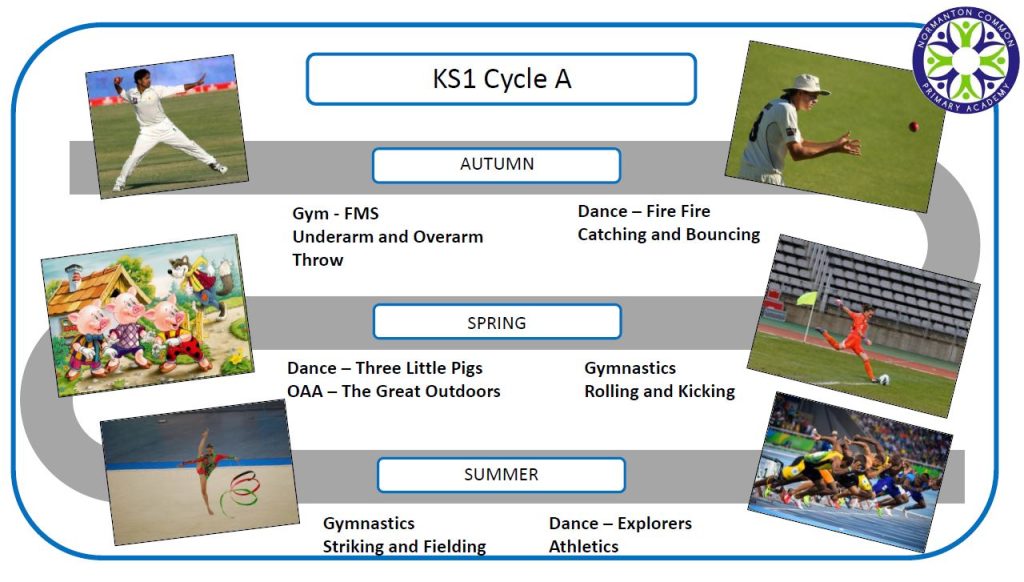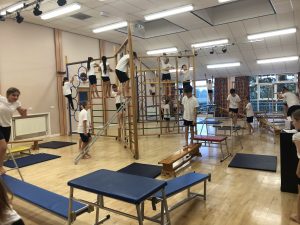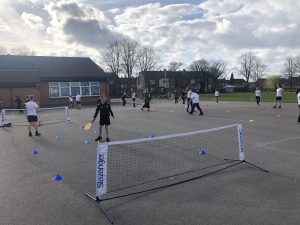Subject Leader : Luke Oldroyd
‘Don’t tell me the sky is the limit when there are footprints on the moon.’
High-quality teaching and learning is at the forefront of our curriculum. We aim for our children to become active learners, active citizens and active communicators. We believe PE is used a vehicle to promote these key themes in our curriculum. We encourage all children to be physically active and develop positive habits to improve and sustain their health, physical and mental, and their overall wellbeing.
PE is not the same as sport or physical activity. It draws on a range of disciplines to substantiate its body of knowledge – such as physiology, psychology and sociology. PE brings together the important knowledge from these different disciplines so that pupils can apply them competently and confidently.
PE will reduce inequalities and provide ALL pupils with the knowledge to be able to participate in physical activity especially those from disadvantaged backgrounds or with SEND.
In PE pupils will have the opportunity to:
- develop their resilience, independence and confidence.
- work collaboratively, therefore improving teamwork and communication.
- engage within a wide range of team and individual sports.
- take part in competitive sports and team games.
- improve their fitness, mental and physical health and well being.
- evaluate and improve their own performance resulting in increased leadership skills.
Click on the link below to see an overview of our PE Curriculum:

How is the content / theme chosen?
The content is chosen to make effective links with key themes and ensure coverage of the expectations as set out in the National Curriculum programmes of study, as well as the EYFS framework. This runs alongside our competitive sporting calendar. At Normanton Common Primary Academy we ensure a clear, sequenced progression, which is taught systematically for all pupils to acquire the intended knowledge and skills. The content may be adapted or changed, based upon the needs or interests of specific cohorts.
Getting better at PE is built upon three pillars of progression: motor competences; rules, strategies and tactics; and healthy participation. Pupils build declarative and procedural knowledge about physical activity. Declarative knowledge is the ‘know-what’ and procedural knowledge is the ‘know-when’. There are many overlaps between types of knowledge and pillars of progression.
Motor Competences
These are a person’s ability to make a range of physical actions which include co-ordinating fine and gross motor skills. These are to being able to in everyday activities as well as in play and physical activity. For some children, PE will be the first time these competences are taught. Pupils require sufficient and well-designed opportunities to practise these competences as well as feedback to know how to improve. There is a positive link between confidence and competence.
Fundamental Movement Skills
In the early years, pupils need to develop a good level of fundamental movement skills which are the basic motor patterns which are not learned naturally. They include locomotor skills (such as running and jumping), stability skills (such as twisting and balancing), and manipulation skills (such as throwing and catching) which are best developed between the ages of 3 and 8. The curriculum should include progression from these simple movements to more complex movements as children get older.
Rules, Strategies and Tactics
Pupils also need to be taught how to move as well as competently. The rules, strategies and tactics which are involved with different types of activity require explicit teaching. Tactics are the decisions people make about how, when and where to move and are closely related to motor competences as they are only successful if pupils can perform the necessary movement. Some physical activities do not have rules or tactics but they do have strategies for success. These are less time-dependent than tactics and can have broader relevance beyond playing games.
Healthy Participation
Pupils need to learn how to participate in physical activity in a healthy way. This can involve having their understanding from outside of school challenged and corrected. For example, public health messages can sometimes be unclear and unhelpful unless pupils understand them in the correct context. Children need to understand how their knowledge of health applies to physical activity so they can participate fully and safely.
How do we ensure progression of knowledge and skills?
At Normanton Common Primary Academy we have in place, for each subject area, a knowledge and skills progression document, which is used for planning, to ensure sequenced and appropriate content for specific year groups. Teachers are clear on the learning and expectations for each year group, as this has been carefully selected and mapped out so that children are building on prior knowledge and skills each term and each year. A vocabulary progression document alongside a sport specific vocabulary document is also in place to ensure children are exposed to the relevant vocabulary throughout their PE lessons. Within these documents there are opportunities for differentiation, in order to meet the needs of all learners.
How is the subject taught?
Children are exposed to both and indoor and an outdoor PE session weekly. Children in EYFS also have access to outdoor provision daily, as well as specific interventions which promote the development physical skills, balance and co-ordination.
A two year, long term rolling programme maps out the coverage of the discrete teaching and learning opportunities for children to develop and embed specific skills. This ensures coverage of the National Curriculum, for Physical Education across Key Stage 1 and 2 and work within and beyond the Early Year’s Framework across our Foundation Stage. Each year group will undertake 2 units of Physical Education per half term. This ensures that a wide range of physical skills are taught. Physical Education is assessed through a series of core skills activities which are undertaken at the beginning and end of each unit.
Within each discrete block of PE teaching, class teachers carefully plan the specific outcomes for their year group, based upon age appropriate knowledge and skills, as well as the needs of the cohort or individuals within it. There is a strong focus on developing the vocabulary of our children and retention of this through practical learning opportunities.
Teachers will model to the children with accurate demonstrations which clearly show the movements they need to imitate. Teachers will regularly check understanding throughout the process. They will break down complex movements into small segments in order to reduce cognitive demand on pupils.
As well as the discrete teaching of knowledge in PE lessons, Health related investigation days are planned to ensure that children have regular opportunities to embed their knowledge and practise their skills throughout the year. Children regularly engage in in practical, ‘hands on’ learning, visits out, as well as visitors to school, to enhance their experiences further.
PE is one of our key subject drivers in developing the ‘Challenge & Educate’ side of our school curriculum. These will be introduced with every new unit of PE. Through studying a range of people from the past and present, who have had an impact on the world of Health, Well-being and Physical Activity, as well as a range of countries and cultures, children learn about and are taught to challenge stereotypes connected to gender, wealth, disability and cultural background. They are educated that differences should be celebrated and are not a barrier to achievement.
Pupils also have additional opportunities to extend their scientific knowledge and skills through cross-curricular work. Strong links with other subject areas, particularly Maths and English, ensure that children have numerous opportunities to apply skills across the curriculum. Opportunities to learn about significant people, including athletes and other entrepreneurs are carefully chosen, so that children are continually developing the sense of the importance of Physical Education in the wider world. This learning also strengthens the links between PE and other subjects.
How do we know that our children are making progress?
Ongoing assessments of the children’s knowledge and skills is observed by the class teacher. Children’s outcomes are compared to the subject specific skills and knowledge documents. At the end of a block of discrete teaching (or term) subject leaders gather an overview of children’s outcomes in each subject area. This is used to plan appropriate next steps for their future learning, as well as provide an overview of learning within a subject area across the whole school. Provision and assessment is tailored and adapted for pupils with SEND. This involves making adaptations to the colour or size of equipment or by providing additional times during sequences of activities or games. However, we ensure that we will not limit any children with SEND. End of year assessments are collated for children at the end of EYFS and Key Stage 1 & 2.
How do we promote our Curriculum Intent?
Active Learners
During PE children will have the opportunity to both participate with individual team games throughout the year. This will provide them with the necessary tools to be able to improve their independence as well as working collaboratively. Throughout the units of PE children will have the opportunity to perform and display their skills to their peers, other classes and participate in competitive sports. This will ensure pupils take pride in their learning. As the children move through school, they will be exposed to a variety of difficult situations within both individual and team games. This will help to build up the children’s resilience and engagement where we will foster a ‘don’t give up’ attitude.
Active Citizens
Health and Wellbeing is at the forefront of our curriculum and PE is a crucial vehicle to equip the children with the knowledge and skills to be able to understand the importance of these two aspects. Children will be given the knowledge and experience needed for them to understand their importance. Children will have the opportunity to both display their skills to other members of the class therefore providing the opportunity to celebrate differences and provide constructive feedback for their own and others’ performances.
Active Communicators
In PE, children will be exposed to a wide range of vocabulary for both specific sports and other health and wellbeing terminology. Children will have the opportunity to use their oracy skills to provide feedback and evaluate their own and others’ performance.
What wider opportunities are provided for our children?
Children will have the opportunity to participate within interschool competitions during every unit of PE. There will also be opportunities for ALL to represent the school in a variety of competitive games. Children across school take part in daily bursts of physical activity including ‘wake up shake up’ ‘dough disco’ ‘Burn2Learn activities’ and ‘The Daily Mile’. These activities run alongside PE lessons and other active outdoor play and learning opportunities. During unstructured times such as break time and lunch, pupils are encouraged to stay active.
Play leaders and playground buddies are employed to lead and encourage physically active play. The lunch time and after school curriculum has been developed to enhance opportunities so that children can attend a range of active after school clubs, run by both teachers and qualified coaches. Throughout the year, children will have the opportunity to participate in whole school celebration days such as: race for life, jump rope and sports days.
PE in action...


